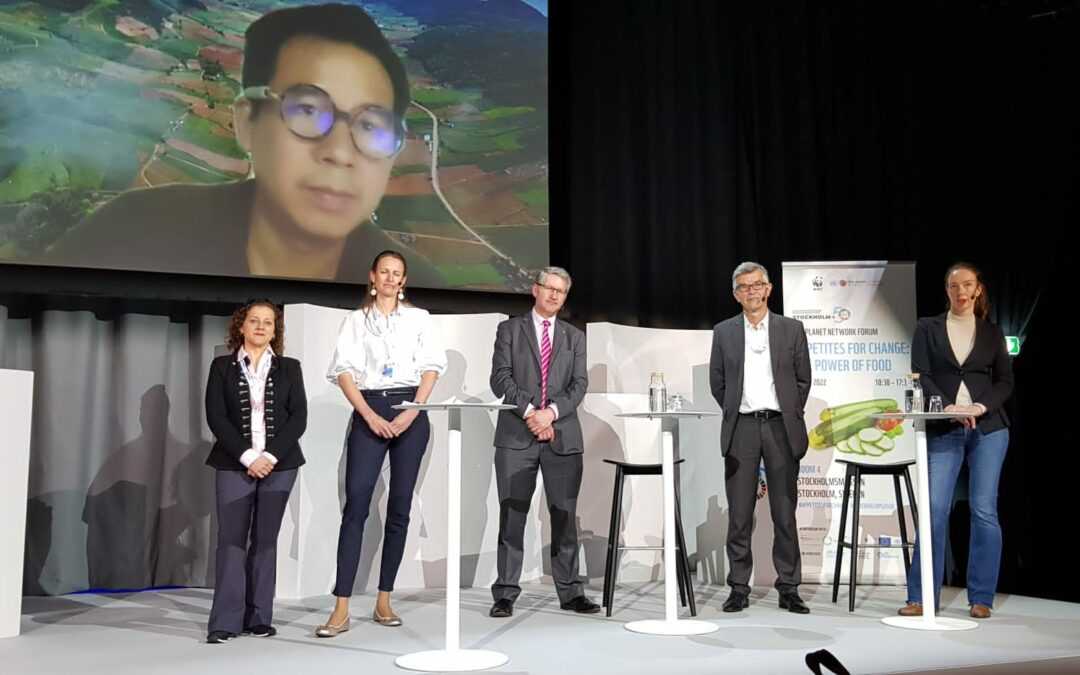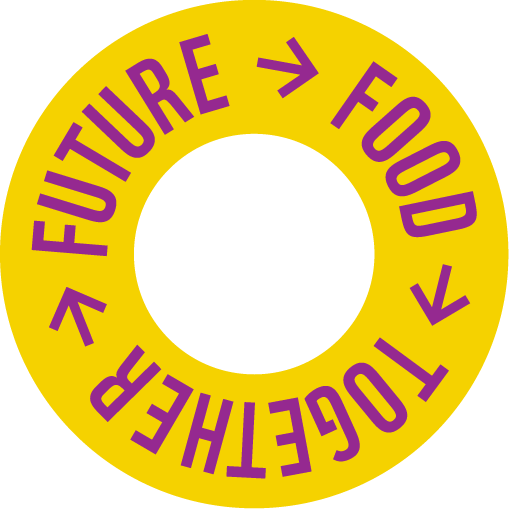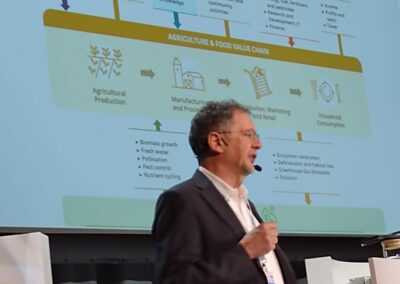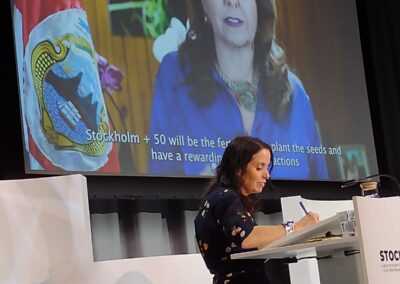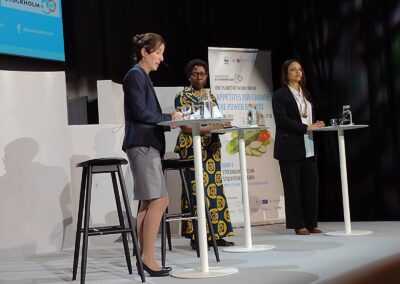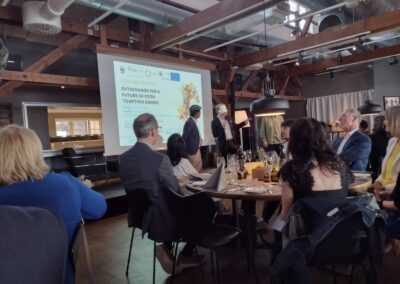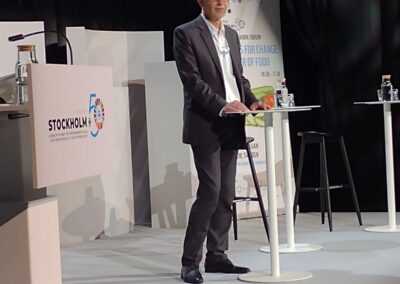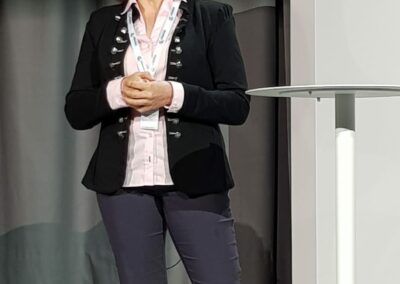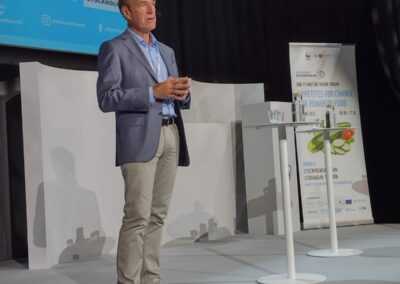Panel at food-related side event at Stockholm+50. From right to left: Helena Leurent, Executive Director, Consumers International; Dr. Ulf Jaeckel, Head of the Unit Sustainable Consumption, Product-related Environmental Protection at the German Federal Ministry for the Environment, Nature Conservation, Nuclear Safety and Consumer Protection; Richard Swannell, International Director, WRAP; Vicky Sins, Decarbonization & Energy Transformation Lead, World Benchmarking Alliance; and WWF Future Food Together lead Tanja Ploetz. On screen (participating virtually): Ply Pirom, Project Manager of the SCP Project, WWF-Thailand. © WWF-Germany
WWF and Future Food Together co-organized and participated in a full day event on food systems titled “Appetites for Change: The Power of Food”, together with the UN One Planet network Sustainable Food System Program. The event took place on 1 June 2022, a day prior to the Stockholm+50 international environmental meeting (2-3 June 2022).
The full day dialogue addressed the need for inclusive, whole-of-society governance to implement the necessary integrated, systems-based solutions. Stockholm+50 represented a landmark opportunity – 50 years since the first ever UN conference on the environment – to continue driving the momentum towards a transition to sustainable food systems.
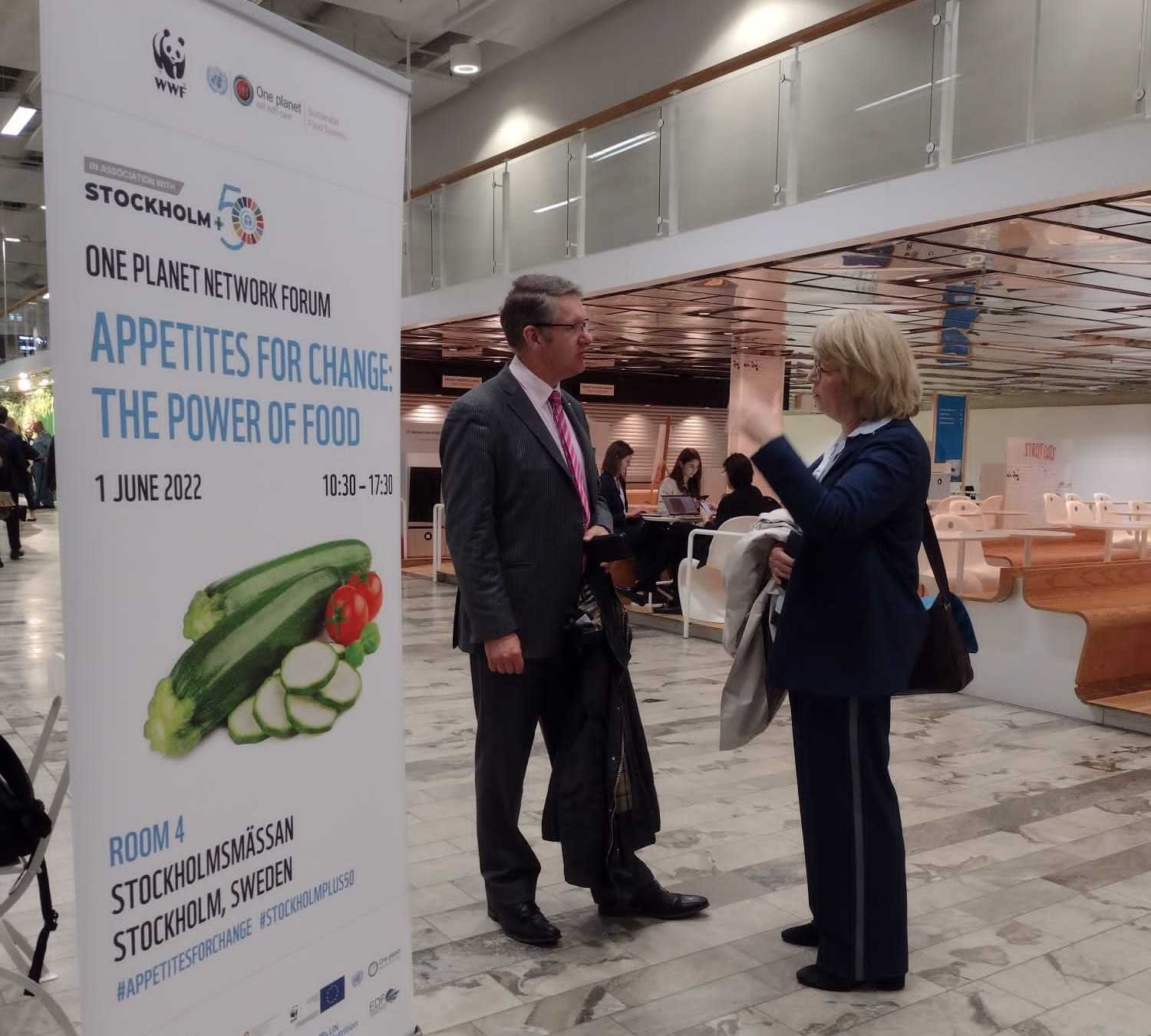
Richard Swannell, International Director, WRAP and Martina Fleckenstein, WWF Food Practice Global Policy Lead, discussing the power of food. © WWF-Germany
Background
Fifty years after the United Nations Conference on the Human Environment in Stockholm, humans are causing unprecedented change to the global environment and are risking tipping points with major and irreversible changes.
The challenges are better known than ever – and so are the solutions we need to embrace. We are facing a gap in action. The pace of transformation is still frighteningly slow, while the most vulnerable remain disproportionately impacted. Time is running out to protect our living planet and meet socioeconomic development needs around the globe. The IPCC Report 2021 showed that the current system will bring irreversible impacts as natural and human systems are stressed beyond their adaptation limits[1]. What is needed is systemic transformation. WWF called for:
- Transforming our relationship with nature and restoring ecosystems, by securing a clear measurable global goal to be nature positive by 2030;
- The need to redefine economic success;
- Accelerating progress on sustainable consumption and production;
- Accelerating implementation for nature, climate and people, through “green” and rights-based economic recovery measures.
For these actions to materialize, we must address the inherited structures and governance schemes that pose barriers to systems-wide change. In recent years, a growing number of actors – businesses, financial institutions, civil society organizations – have become involved in governance. However, for changes to be developed and implemented, governance must become more inclusive, with participatory processes that have clearly defined, fair and transparent decision-making procedures, rights and responsibilities. The urgently needed changes at scale will not occur unless we tackle the barriers of political incoherence, weak multilateralism, and limited accountability, in order to enable integrated policy-making, re-align global finance to the SDGs, and address power imbalances[2].
Appetites for Change: The Power of Food

The full day dialogue also aimed at having an open conversation on the need for more inclusive governance arrangements as a pre-condition to implement a systems approach to transformation of the agri-food sector: one that considers food systems in their entirety, taking into account all interrelated dimensions (access, hunger, malnutrition, environment, livelihoods, culture, etc.), which requires participation from across sectors and of the whole-of-society, especially the most vulnerable and underrepresented groups. “Appetites for Change” built on a prior event on 21 March as the Stockholm+50 Preparatory Meeting in New York that delivered these key messages, partially picked up by the Stockholm+50 Leadership Dialogue background paper. The afternoon sessions focused on the potential of sustainable diets to mitigate the triple planetary crises and drive human and planetary health with prosperity for all.
The day was rounded off with a dinner event.
Stockholm+50 represented a landmark opportunity – 50 years since the first ever UN conference on the environment – to create synergies between the follow-up processes of the UN Food Systems Summit 2021, the three Rio Conventions, and other key multi-lateral environmental agreements (MEAs).
Dinner event at Fotografiska
WWF Eat4Change and FutureFoodTogether convened 100 key voices committed to shifting diets to a healthier and more sustainable planet, including leaders from the three UN Rio Conventions, youth, indigenous communities, civil society, media, businesses and countries. The 15 youth representatives from different parts of the world provided the starkest remarks of the evening, reminding the present decision-makers and practitioners about the utter urgency to turn commitments into action.

© WWF-International
The Way Forward
A set of ten recommendations for action to accelerate implementation were issued by the UN Stockholm+50 Secretariat after the conference, which included a range of WWF inputs. Following we highlight a few of these calls to action and explain why they are important:
- Recognize and implement the right to a clean, healthy, and sustainable environment through the realization of the vision articulated in Principle 1 of the 1972 Stockholm Declaration.
This represents one of the first official UN recommendations to call for the implementation of this “new” right, which was only formally recognized in October 2021 by the UN Human Rights Council
- Adopting a system-wide change in the way our current economic system operates to contribute to a healthy planet.
This represents the first ever reference to the need to re-visit the rules that govern the economy in order to halt and reverse the triple crises and ensure shared and fair prosperity.
- Strengthening national implementation of existing commitments and promoting evidence-based policymaking for a healthy planet by improving national environmental legislation, planning processes, and institutional frameworks.
- Aligning public and private financial flows with environmental, climate, and sustainable development commitments through the development and implementation of well-designed policies.
- Speeding up system-wide change in high-impact sectors such as food, energy, water, buildings and construction, manufacturing, and mobility by adopting and implementing policies that promote circular economy, resource efficiency, renewable production approaches, and nature-based solutions in value chains such as transforming food systems by promoting regenerative agriculture approaches that enable healthy diets and minimize food waste.
The WWF Future Food Together initiative puts food system transformation through sustainable consumption and production at the center of the solution pathway for the triple planetary crises of climate change, biodiversity loss and environmental pollution, as well as for the achievement of sustainable development and prosperity for all.
[1]IPCC. 2022. Climate Change 2022: Impacts, Adaptation, and Vulnerability. Cambridge University Press. In Press.
[2] SEI and CEEW. 2022. Stockholm+50: Unlocking a Better Future. SEI report. Stockholm Environment Institute, Stockholm.

